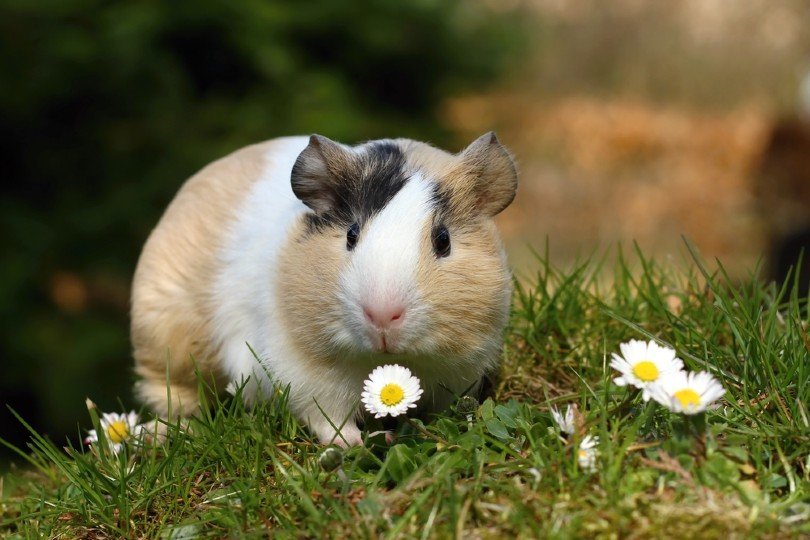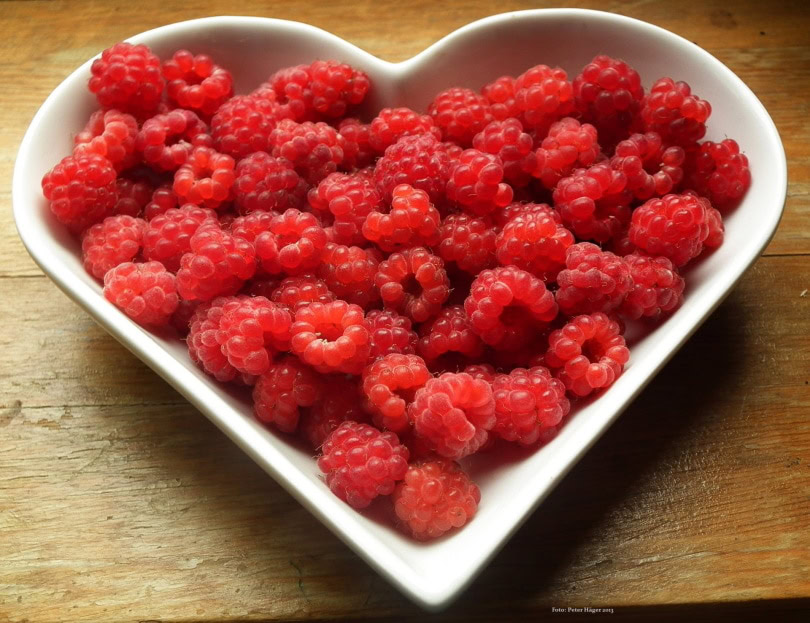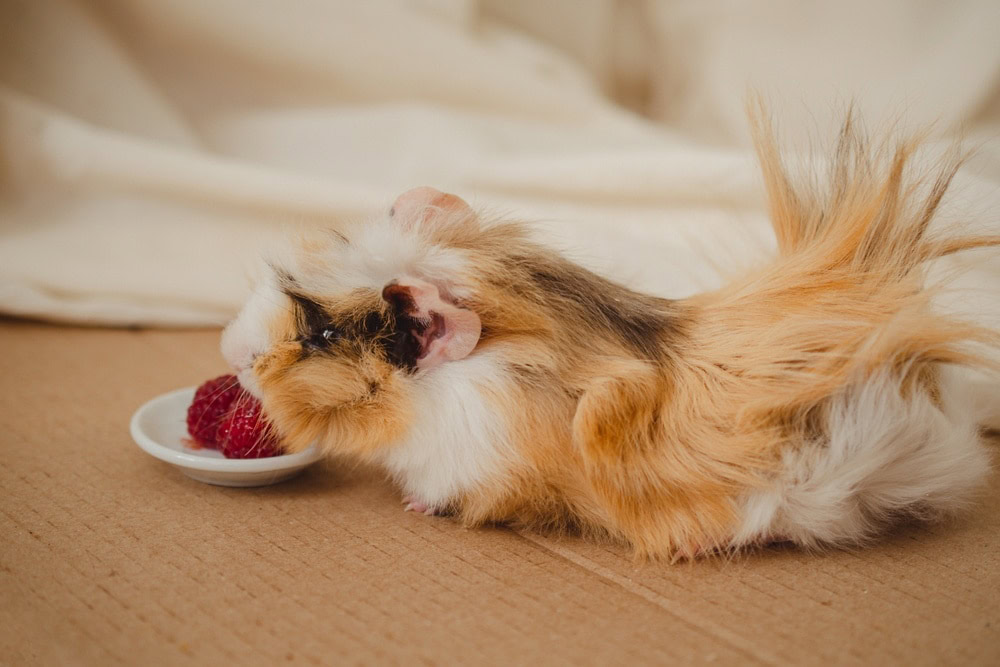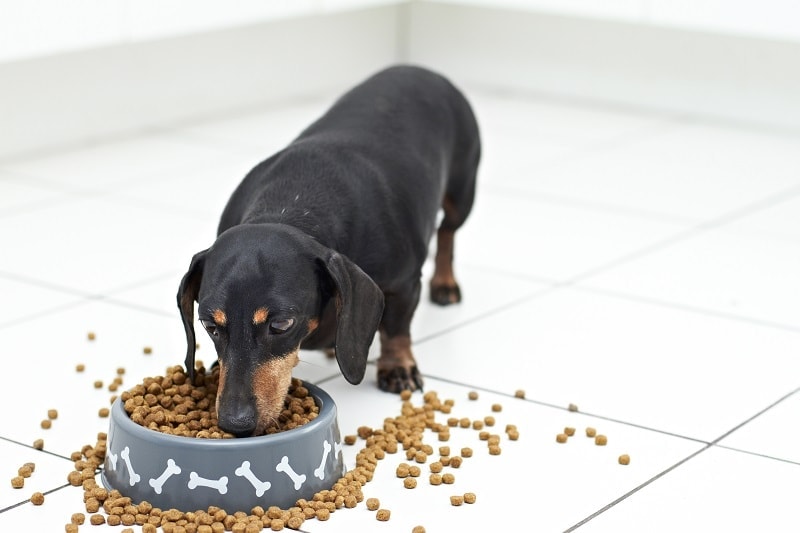VET APPROVED

The information is current and up-to-date in accordance with the latest veterinarian research.
Learn more »Click to Skip Ahead
Guinea pigs will often eat almost anything that you give them, especially when it comes to fruits and vegetables they’re used to eating. Certain kinds of human foods are great for them, while others could potentially do them harm.
What about raspberries, the red gem of fruits? Can guinea pigs eat these? Yes, guinea pigs can eat raspberries.
In this article, we dig into the nutritional benefits and possible risks of your guinea pig eating raspberries and how to feed them this tasty fruit.

Can Guinea Pigs Eat Raspberries?

Raspberries are safe for guinea pigs. As herbivores, guinea pigs can properly digest raspberries and derive meaningful nutrition from them. Like all fruits, raspberries shouldn’t form a considerable portion of your guinea pig’s diet. In fact, they should only constitute a very small portion of their diet. In addition, vegetables seem to better fit their nutritional requirements as pets.
Nutritional Benefits of Raspberries for Guinea Pigs
Not only can guinea pigs eat raspberries, but they also have plenty of nutritional benefits.
- Energy: 9.88 kcal
- Water: 16.3 grams (g)
- Protein: 0.228 g
- Fat: 0.124 g
- Carbohydrates: 2.26 g
- Fiber: 1.24 g
- Total sugars: 0.84 g
- Vitamin C: 4.98 milligrams (mg)
Source: USDA
The greatest nutritional perk of raspberries is that their sugar content is moderately low for a fruit, and they are a source of Vitamin C. Like humans, guinea pigs cannot make their own Vitamin C, and foods offered to them should ideally be those that contain it. Raspberries also contain other vitamins and minerals, however, given how fruit shouldn’t form a huge portion of a guinea pig’s diet, these benefits aren’t perceived as overly impactful.

Potential Risks of Feeding Your Guinea Pig Raspberries
Raspberries do not carry any risks when fed in appropriate amounts to your guinea pig. If fed in excess, they will lead to health problems from an imbalanced diet. Complications include:
- Dental issues: Fruits are very soft and don’t allow your pet the opportunity to chew and keep their teeth in check. A guinea pig’s incisors keep growing throughout their life, and they can develop health issues without appropriate foods to chew on.
- Fiber concerns: Most of a guinea pig’s diet should be hay, which provides the fiber they need to keep their digestive system healthy. Fruits do not provide them with enough fiber.
- Gastrointestinal distress: Guinea pigs who eat too many raspberries in a single sitting may develop issues such as diarrhea.
- Rejection: Guinea pigs are neophobic (scared of new experiences), particularly with food and water. If they aren’t offered raspberries as juveniles, there’s a very high chance that they will reject them as adults and go off their other food as well. This is very problematic for guinea pigs.
- Weight gain: Fruits, due to their sugar content, can lead to weight gain in guinea pigs. This makes them a poorer option when compared to vegetables

How to Feed Raspberries to Your Guinea Pig
Although raspberries aren’t technically toxic for guinea pigs to eat, they shouldn’t consume them too often. You should limit the number of raspberries that they eat. Guinea pigs should not eat raspberries every day. Instead, it is best to give them different fruits throughout the week to provide them with a versatile diet.
It is best to feed raspberries to guinea pigs only once or twice a week. Fruits should not comprise more than 5% of their diet, though the exact amount depends on your guinea pig’s weight, size, and life stage. As such, to ascertain a specific amount to feed your guinea pig, you should consult your veterinarian.
Other Fruits That Guinea Pigs Can Eat
There are plenty of other fruits that you can give to your guinea pig if you want to provide them with a varied diet. After all, it is fun to be able to give them a treat. Other fruits that you can feed your guinea pig throughout the week include:
- Blueberries
- Blackberries
- Strawberries
- Melons
- Kiwis
- Pineapples
- Mangos
- Bananas
A guinea pig’s primary diet should be fresh hay and leafy vegetables. They should also be offered a pellet made specifically for them. Only give them treats every once in a while. Treats shouldn’t make up more than 5% of a guinea pig’s diet.


Wrapping Up
You can safely feed raspberries to your guinea pig. However, like all fruits, raspberries should be considered a treat and not a dietary mainstay for them. The primary diet of a guinea pig is fresh hay, pellets, and leafy greens. Fruits, if offered, should be considered an occasional treat.
As always, if you have concerns about your guinea pig’s health, contact an exotic veterinarian for more information and clarity.










